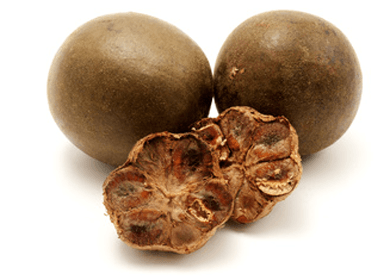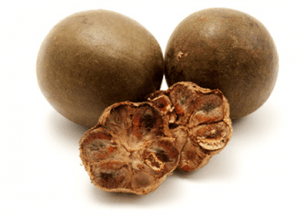
While processed, artificial sweeteners are not the best option for sweetening your coffees or teas, there are alternative, natural sweeteners. But buyer beware, many of the large, artificial sweetening companies are starting to produce what they call “natural sweeteners.” The makers of Splenda have introduced a new sweetener called “Nectresse” which they claim is is made from monk fruit. This begs the question, what the heck is monk fruit?
 A Natural Sweetener
A Natural Sweetener
Monk fruit is native to southern China and has been used as a natural sweetener in that region of the world for thousands of years and has also been used to treat obesity and diabetes. It is also known by other names, including Buddha fruit and longevity fruit. It is approximately 300 times sweeter than cane or beet sugar.
Monk fruit contains edible pulp which is often dried. It is sweet and can also be eaten fresh. The rind is used to make a tea. The carbohydrates from monk fruit are largely glucose and fructose. The fruit is round small berries and is sometimes mistaken for mangosteen.
No negative side effects are known for monk fruit. It is recognized by the Food and Drug Administration as a safe food product and there are no restrictions on using the fruit or its extracts.
Research suggests that monk fruit is high in antioxidants. It may have some positive effects on preventing cancer. It has also been shown to reduce the effects of Epstein-Barr virus.
Are the Makers of Splenda Over-Hyping Nectresse and Monk Fruit?
The makers of Splenda have recently introduced a new artificial sweetener called Nectresse that contains monk fruit. However, it contains additional ingredients besides monk fruit. With only four ingredients, Nectresse labels list monk fruit as the third ingredient, meaning the product has less monk fruit than the first two ingredients. The first ingredient is erythritol, a sweet extract made from corn. The second ingredient is refined sugar, most likely derived from sugar beets. The fourth and final ingredient is molasses.
This “all-natural” sweetener may not be all-natural after all. If you are really looking for a natural sweetener, stevia, pure monk fruit extract or organic local bee honey are good alternatives.
Do you use natural sweeteners? Have you tried Nectresse? What do you think about it?
– The Alternative Daily

